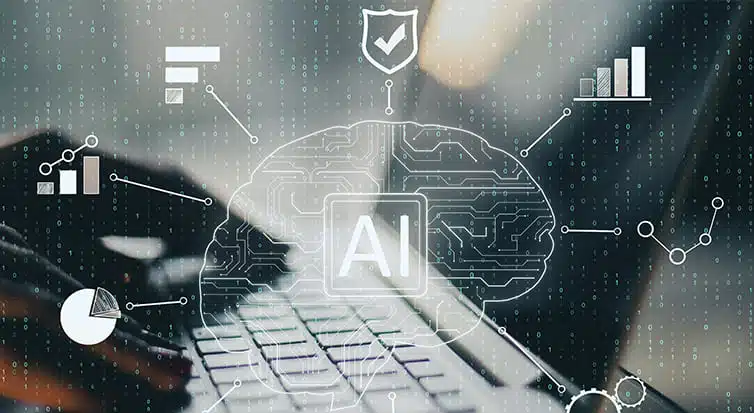Generative AI refers to a subset of Artificial Intelligence (AI) technologies that can generate new content, including text, images, audio, and video, that resembles human-created content.
It works by learning from a large dataset of existing content and then using that information to produce new, original content that did not previously exist.
The technology behind Generative AI includes various Machine Learning (ML) models, with deep learning neural networks being particularly prominent.
Generative AI is not just a cool buzz word thrown around by businesses and individuals. It has become an integral part of every function and is, in fact, giving humans stiff competition when it comes to executing tasks faster and more accurately.
AI in accounting software, particularly, is fast becoming the gold standard for accounting processes everywhere, and with Generative AI, accountants can take process automation and efficiency even further.
In this blog post, we will take a quick look at how Generative AI in accounting can transform how your practice works.
Use cases of Generative AI in accounting
The practical applications of this technology in your sector are manifold. Let us talk about some of the most significant benefits of Generative AI:
1. Integrated tax, payroll, financial reporting, and document automation
By analysing transactional data, Generative AI can generate comprehensive financial reports, including income statements, balance sheets, and cash flow statements.
It can prepare and file tax returns by automatically identifying deductible expenses, calculating tax liabilities, and suggesting optimisation strategies for tax savings.
Regarding payroll, Generative AI can undertake research, payroll, leave management, bank reconciliation, and task assignment. It can create financial documents, contracts, and agreements based on templates and specific input data.
This automation can help you focus on analysis and advisory roles rather than manual report preparation.
2. Automated data entry and transaction coding
3. Financial forecasting and analysis
This is one of the most fundamental applications of AI in accounting and finance. AI-powered software can study market trends, parse large volumes of data and draw deep insights from it, supplying you with timely and relevant inputs on the decisions you wish to make.
You can create detailed financial models and forecasts, helping your client businesses with budgeting, financial planning, and investment decisions.
4. Learning and development
Generative AI in accounting can help to train yourself and your practice staff in relevant skills and knowledge areas.
The technology can draw up summaries of books and research papers, craft step-by-step tutorials and questionnaires, and offer custom tips and prompts based on the individual’s weaknesses and strengths.
It can also help you with complex tasks by designing custom Excel formulas. In other words, it serves as a personal, all-knowing tutor to accountants looking to level up their technical skills.
5. Audit and compliance
Generative AI in accounting can analyse large volumes of financial data to identify anomalies, potential fraud, or errors, making the audit process more efficient and accurate. It also ensures compliance with constantly changing tax laws and financial regulations.
The penalties for improper financial reporting can be massive, so having AI accounting software to check everything for accuracy is a big plus. Generative AI can also handle tasks like filling in complex policy documents or writing footnotes to financials.
6. Fraud detection
Top-quality AI accounting software can detect irregularities or anomalies in financial data, which is vital for catching and preventing fraudulent activity and conducting internal audits much more smoothly.
Generative AI in accounting can even help design high-level strategies against fraud within the specific constraints of the client business’s resources. It can also design specific statistical models to detect anomalies in datasets based on the constraints you feed it with.
Benefits of AI in accounting
There are several clear benefits to the introduction of Generative AI for accounting firms. For instance, the technology can:
- Reduce the time required for accounting processes through automation
- Easily scale up or down support based on the volume of transactions and data
- Pinpoint areas where your client businesses can reduce costs, such as by choosing different vendors or automating certain tasks
- Offer tailor-made recommendations that are actionable right now and not at the end of the accounting period
- Reduce human errors in data analysis, leading to more accurate financial statements and tax filings
What does the future of Generative AI in accounting hold?
Many have raised concerns about whether AI in accounting and finance will “replace” humans. Remember a similar debate when outsourcing entered the picture in the 1990s?
Well, AI experts agree that advanced technology cannot take over things involving creativity and abstract problem-solving.
Moreover, this technology is only as good as the prompts it is fed with, so you must invest in skill-building and gaining practical knowledge of how AI works. You should learn the art of issuing smart commands to tools like ChatGPT for optimal results.
Please be aware, there will be a learning curve to contend with, especially for accountancy practices that are not tech-heavy to begin with.
Get ready for Generative AI and accounting outsourcing
Accounting outsourcing, when combined with the capabilities of Generative AI, represents a transformative shift for your accountancy practice. This fusion allows you to delegate routine tasks to external specialists, optimising operational efficiencies and focusing internal resources on higher-value activities.
This arrangement also opens up new avenues for service offerings, including real-time financial analysis, predictive insights, and personalised financial advice. It empowers you to deliver superior client value, and adapt more swiftly to the changing financial landscape.
If you want to learn more about accounting outsourcing, contact us today!




